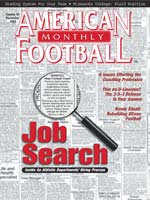AMERICAN FOOTBALL MONTHLY THE #1 RESOURCE FOR FOOTBALL COACHES
Article CategoriesAFM Magazine
|
Job SearchLifting the Cloud of Mystery of Search Commities© More from this issue For most observers, the process colleges use to find a head coach appears swathed in mystery. You hear reports, rumors and innuendo in the mass media, and sometimes surprise candidates are selected, not the obvious or “smart-money” choices. But this is the glamour job at most high schools and colleges. How do schoolssearch for the right candidate? Well, many high-profile programs go to smallfirms that specialize in suggesting lists of coaches and administrators and thenvetting them. These small firms are often built around one man, and those whoare successful in this field are as “inside” as inside can be. They’vemade their names by working in the college environment, and they’ve usedtheir expertise and experience to gain the trust of school administrators. Thesemen have an enviabl....The full article can only be seen by subscribers. Subscribe today!
|
|
|||||||
| HOME |
MAGAZINE |
SUBSCRIBE | ONLINE COLUMNISTS | COACHING VIDEOS |
Copyright 2026, AmericanFootballMonthly.com
All Rights Reserved





